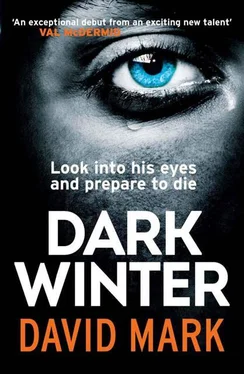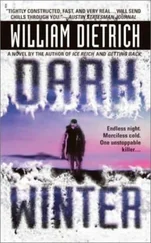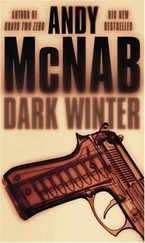David Mark - The Dark Winter
Здесь есть возможность читать онлайн «David Mark - The Dark Winter» весь текст электронной книги совершенно бесплатно (целиком полную версию без сокращений). В некоторых случаях можно слушать аудио, скачать через торрент в формате fb2 и присутствует краткое содержание. Жанр: Полицейский детектив, на английском языке. Описание произведения, (предисловие) а так же отзывы посетителей доступны на портале библиотеки ЛибКат.
- Название:The Dark Winter
- Автор:
- Жанр:
- Год:неизвестен
- ISBN:нет данных
- Рейтинг книги:5 / 5. Голосов: 1
-
Избранное:Добавить в избранное
- Отзывы:
-
Ваша оценка:
- 100
- 1
- 2
- 3
- 4
- 5
The Dark Winter: краткое содержание, описание и аннотация
Предлагаем к чтению аннотацию, описание, краткое содержание или предисловие (зависит от того, что написал сам автор книги «The Dark Winter»). Если вы не нашли необходимую информацию о книге — напишите в комментариях, мы постараемся отыскать её.
The Dark Winter — читать онлайн бесплатно полную книгу (весь текст) целиком
Ниже представлен текст книги, разбитый по страницам. Система сохранения места последней прочитанной страницы, позволяет с удобством читать онлайн бесплатно книгу «The Dark Winter», без необходимости каждый раз заново искать на чём Вы остановились. Поставьте закладку, и сможете в любой момент перейти на страницу, на которой закончили чтение.
Интервал:
Закладка:
It is already 6 p.m. The drive back from Beeford, twenty miles up the coast from his North Hull home, will take an hour in these conditions. He will have to pass his own front door on his journey back to the central police station, and the thought makes him irritable, but a recent order from the Chief Constable’s office forbade the overnight use of pool cars without prior written approval, and McAvoy assumes there must be a good reason for the directive, and will ensure it is enforced.
A gap suddenly opens up in the hedgerows to McAvoy’s right and he gently swings the lumbering vehicle into the space for which he has been searching. In daylight, in spring, he imagines the scene around him will be a watercolour of ploughed brown soil and swaying blonde corn; but in this Stygian dark, this feels a lonely place, and it is with relief that he spies the brooding hulk of the tall, slate-grey farmhouse as the car grinds over firm, reassuring gravel and up the private drive.
A security light blinks on as McAvoy ramps up next to a muddy 4x4 in the oval parking area. An elderly woman is standing at an open back door. Despite the quizzical expression on her face, she has an attractiveness about her that the years have not diluted. She is straight-backed and slim. Subtle adornments — designer reading glasses, Swarovski crystal earrings, the softest trace of blush-coloured lipstick — gild soft, neatly composed features. Her short bobbed hair looks as though it is drawn in pencil. She is wearing a sleeveless body warmer over a burnt-orange sweater, with navy-blue, neatly pressed slacks tucked into thick walking socks. In her hand she holds a wine glass, containing just the faintest puddle of red.
McAvoy opens the car door into a gust of wind that threatens to pull his tie from around his neck.
‘This is private property,’ the woman says as she reaches down for a pair of wellington boots that stand by the door. ‘Are you lost? Were you looking for the Driffield road?’
McAvoy feels colour rising in his cheeks. He slams the car door shut before his notes, loose on the passenger seat, can start playing games with the wind. Quickly, he calls up her name from memory.
‘Mrs Stein-Collinson? Barbara Stein-Collinson?’
The woman is halfway out into the driveway, but her name stops her short. A look of concern freezes her face. ‘Yes. What’s wrong?’
‘Mrs Stein-Collinson, my name is Detective Sergeant Aector McAvoy. Might we go inside? I’m afraid I have-’
She shakes her head, but her denial is not directed at the policeman. It is as though she is aiming the gesture at a vision. A memory. Her face softens, and she closes her eyes.
‘Fred,’ she says, and her next words do not sound like a question. ‘The silly sod’s dead.’
McAvoy tries to catch her eye, to hold her gaze in the earnest, comforting way he does so well, but she is not paying him any attention. He turns away, oddly embarrassed, though it is more at the cack-handed way he has handled this, the only mission for which his superiors feel he is suited. He watches the snow fall inconsequentially onto the gravel. Sniffs politely as the cold makes his nose run.
‘Found him, have they?’ she asks at last.
‘Perhaps we could-’
Her sudden glare cuts him dead. She stands there, snarling, her head shaking, her glasses slipping down her nose as her countenance turns hard and cold. She spits out her words, as if taking bites out of the air.
‘Forty years too bloody late.’
‘Would you mind taking your boots off? We have a cream carpet in the kitchen.’
McAvoy bends down and starts unfastening the soggy, triple-knotted laces. Lets his eyes sweep the little cloakroom from his vantage point at knee height. No wellingtons. No dog baskets. No rubbish bags or newspapers waiting for the next bonfire or tip-trip. Incomers , he thinks instinctively.
‘So,’ she says, standing above him like a monarch preparing to bestow a knighthood. ‘Where did they find him?’
McAvoy looks up, but can’t make eye contact without straining his neck, and can’t unpick his laces without looking at them. ‘If you’ll just give me a moment, Mrs Stein-Collinson …’
She responds with an irritated sigh. He imagines her face becoming stern. Tries to decide if it will do more harm to give her the details from this most inappropriate of positions, or to make the poor lady wait until he’s removed his boots.
‘He was about seventy miles off the coast of Iceland,’ McAvoy says, trying to inject as much empathy and compassion into his voice as he can. ‘Still in the lifeboat. A cargo ship saw the vessel and the search teams went straight to the scene.’
With a tug, he pulls off one boot, coating his thumb and forefinger in thick mud. He surreptitiously wipes his hand on the seat of his trousers as he begins work on the other.
‘Exposure, I assume,’ she says thoughtfully. ‘He won’t have taken any pills. Won’t have wanted to numb himself to it, our Fred. Will have wanted to feel what they did. I never guessed this was what he was planning. I mean, who would? Not when he’s laughing and telling stories and buying everybody a drink …’
McAvoy wrestles the other boot free and stands up quickly. She’s already halfway through the open door, and it’s with relief that he leaves the cloakroom and steps into the large, open kitchen. He’s surprised by what he finds. The kitchen is as unruly as a student bedsit. There are dirty dishes stacked high around the deep porcelain sink which sits beneath a large, curtainless window. Splashes of grease and what looks like pasta sauce are welded to the rings of the double-oven at the far end. Newspapers and assorted household bills are scattered across the rectangular oak table that fills the centre of the room, and laundry sits in crumpled islands all over the precious carpet, which has not been cream in many a year. His policeman’s eye takes in the dribbles of wine that sit at the bottom of the dirty glasses on the draining board. Even the pint glasses, embossed with pub logos, seem to have been used for the slugging of claret.
‘That’s him,’ she says, nodding at the wall behind McAvoy. He turns and is greeted with a stadium of faces; a gallery of higgledy-piggledy photographs stuck or Sellotaped to a dozen cork boards. The photos are from each of the last five decades. Black and white and colour.
‘There,’ she says again. ‘Next to our Alice. Peter’s grandniece, if that’s a word. There he is. Looking like the cat that got the cream.’
McAvoy focuses on the image that she is pointing to. A good-looking man with luscious black hair, swept back in a rocker’s quiff, holding a pint of beer and grinning at the camera. The fashion of the man in the foreground suggests it was taken in the mid-eighties. He’d have been thirty-something. McAvoy’s age. In his prime.
‘Handsome man,’ he says.
‘He knew it, too,’ she says, and her face softens. She reaches out and strokes the photo with a pale, bejewelled hand. ‘Poor Fred,’ she says, and then turns to look at McAvoy, as if seeing him for the first time. ‘I’m pleased you came. It wouldn’t have been nice to hear it in a phone call. Not with Peter away.’
‘Peter?’
‘My husband. He does a lot of work with the police, actually. You might know him. He’s on the authority. Was a councillor for many a year until it got a bit much for him. He’s not as young as he was.’
The mention of the Police Authority comes as a slap to the jaw. McAvoy takes a breath. Tries to do what he came for. ‘Yes, I’m aware of your husband and all the hard work and dedication he put in to campaign for the police service. As soon as we heard the sad news about Mr Stein, Assistant Chief Constable Everett asked me to come and speak to you personally. We’re in a position to be able to offer you the services of a highly qualified family liaison officer and-’
Читать дальшеИнтервал:
Закладка:
Похожие книги на «The Dark Winter»
Представляем Вашему вниманию похожие книги на «The Dark Winter» списком для выбора. Мы отобрали схожую по названию и смыслу литературу в надежде предоставить читателям больше вариантов отыскать новые, интересные, ещё непрочитанные произведения.
Обсуждение, отзывы о книге «The Dark Winter» и просто собственные мнения читателей. Оставьте ваши комментарии, напишите, что Вы думаете о произведении, его смысле или главных героях. Укажите что конкретно понравилось, а что нет, и почему Вы так считаете.












